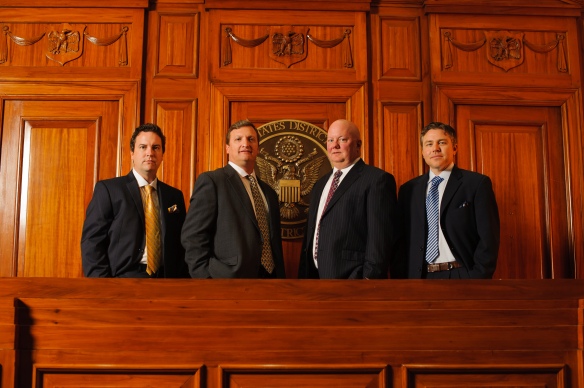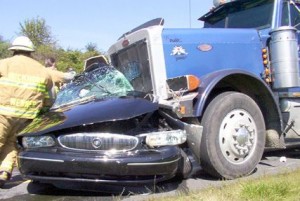
Pictured from left to right: Daryl L. Derryberry, Guy I. Wade, III and Craig D. Zips “Keeping Your Community SAFE One Case At A Time”
On Sept. 16, 2016, plaintiff Clarissa Hill, 31, and her husband, plaintiff Mike Hill, 45, were occupants of a sport utility vehicle that was traveling on Mineola Highway, in Smith County. Their SUV’s rear end was struck by a trailing pickup truck that was being driven Teodoro Ortega. Mr. Hill claimed injuries to his neck. Ms. Hill claimed that she suffered injuries of her low back and right hip.
Ortega told police he had consumed only a single beer, but he failed field sobriety tests and was arrested for DWI. A breath test about two hours after the accident showed a blood alcohol concentration of 0.176, and he was arrested and convicted.
The Hills sued Ortega and Ortega’s employer, Dryce Inc. The Hills alleged that Ortega was negligent and grossly negligent in the operation of his employer’s vehicle. The Hills further alleged that Dryce was negligent and grossly negligent in its hiring of Ortega and in its entrustment of its vehicle.
The defendants acknowledged that Ortega was in the course and scope of his employment at the time of the accident and he alone was responsible for the accident. Dryce had hired Ortega in the late 1980s. Ortega did not disclose a 1985 DWI conviction to Dryce. After a 2010 DWI arrest, he told Dryce’s general manager he was not driving but sitting in his truck in his driveway listening to music. Ortega claimed the same thing in his deposition. However, plaintiffs’ counsel obtained records from the Tyler PD indicating a witness had followed Ortega several miles home at 2 a.m. and called police. The witness told police Ortega had been weaving and driving on the wrong side of the freeway.
Dryce’s general manager acknowledged that she was unaware whether Ortega was convicted in the 2010 incident, and she did not request Ortega’s driving record or try to verify his version of the charges. Also, Ortega’s personnel file contained no criminal background check or driving record. Plaintiffs’ counsel argued that Dryce failed to request Ortega’s driving record or verify what he told the general manager.
In addition, a Dryce corporate representative acknowledged that if the company had been aware of the 2010 conviction, it would have revoked Ortega’s driving privileges. Also, the company, president and owner, Mr. George Wrappe acknowledged he would not want anyone with even one DWI conviction to operate a Dryce vehicle. However, another Dryce corporate representative testified that a single DWI would be acceptable under company policy. The defense argued the prior DWI convictions were too remote to show negligent hiring or negligent entrustment at the time of this accident.
INJURIES/DAMAGES arm; chiropractic; discectomy; epidural injections; fusion, cervical; hand; herniated disc at C3-4; herniated disc at C4-5; herniated disc at CS-6; herniated disc at L3-4; hip; radicular pain / radiculitis
The plaintiffs did not seek immediate treatment.
Mr. Hill claimed that he suffered disc herniations at C3-4, C4-5 and C5-6. He also complained of neck pain and radicular pain in his right (dominant) arm and hand.
Hill underwent chiropractic care from October 2016 to December 2016. He also underwent two epidural steroid injections, which provided temporary relief, but he claimed that he was still unable to lift anything more than 15 pounds or engage in normal activities without pain. He then underwent an anterior cervical discectomy and fusion on Jan. 22, 2019. He testified that he is doing much better since the surgery.
Hill’s paid or incurred medical expenses were about $190,000. He was also seeking damages for future medical expenses, past and future physical pain and mental anguish, past and future physical impairment, and past and future disfigurement.
Ms. Hill claimed that she suffered a herniated disc at L3-4. She also claimed that she suffered right hip pain. A lumbar epidural steroid injection and a hip injection provided some relief. Her neurosurgeon has recommended lumbar surgery. Hill testified that she was unable to sit for long periods and pain with normal activities, including walking.
Hill’s paid or incurred medical expenses were about $24,000. She was also seeking damages for future medical expenses, past and future physical pain and mental anguish, past and future physical impairment, and past and future disfigurement.
The defense argued that, based on the medical records, the Hills’ injuries were almost completely resolved within a few weeks of the accident. Also, Mr. Hill had right arm and hand issues that were pre-existing and unrelated to the accident, the defense argued.
The defense also argued that Ms. Hill’s medical records described her lumbar and right hip pain as a pre-existing condition.
The case settled in mediation for $1,100,000.00 million. After payment of attorneys’ fees ($360,000.00), expenses ($14,364.73) and paying back his medical providers ($107,044.22), one of our clientS received $410,686.05. Our other client received $94,328.02 after payment of attorneys’ fees ($80,000.00), expenses ($14,364.73) and paying back her medical providers ($11,307.25).
TO STAY UP TO DATE WITH THE LATEST LAW NEWS, BE SURE TO FIND US ON FACEBOOK AT https://www.facebook.com/dzwlaw AND FOLLOW US ON TWITTER AT https://twitter.com/DZWLAW and https://twitter.com/URHURT
DERRYBERRY ZIPS WADE, PLLC








